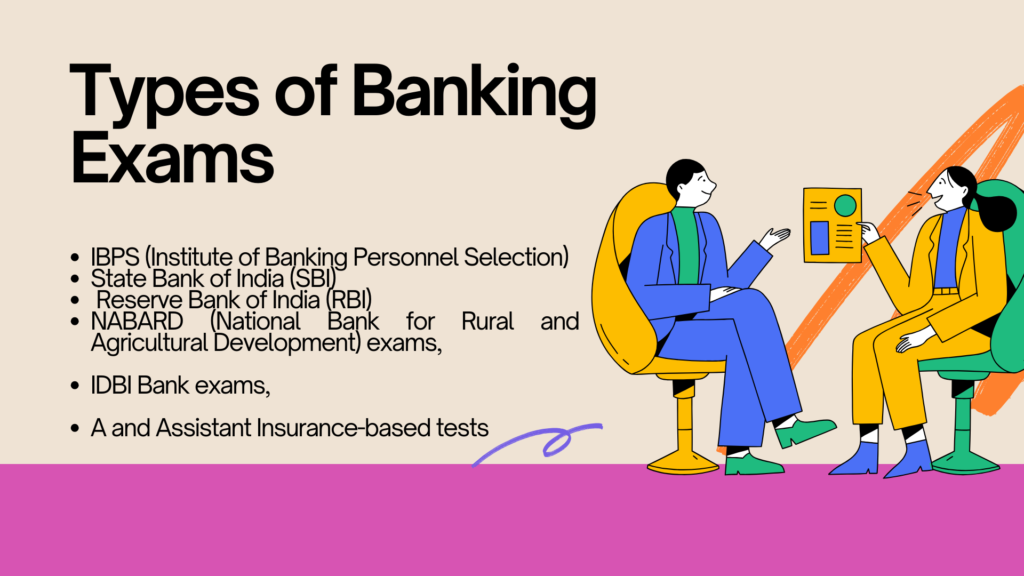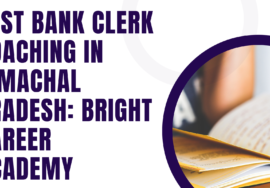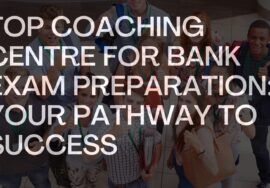
Master Your Banking Exam with Bright Career Academy
Exams for banking have been thought to be a path to a secure and lucrative career in India. With high salaries, job security, and reputation associated with working at government or public sector banks, millions of applicants each year focus on passing these exams. Here at Bright Career Academy, we recognize the enormous importance of these exams and will be there to guide you every step of the way to fulfill your dream of a rewarding banking career.
Understanding Banking Exams and Their Importance
Exams for banking in India aren’t only a test of your abilities but rather a gauge of your commitment, discipline, and commitment. They allow candidates to be considered for coveted jobs that range in rank from assistants and clerks up to probationary officers (POs) as well as Specialist officers (SO) in the most prestigious banks, including those of the State Bank of India (SBI), Reserve Bank of India (RBI), and various regional rural banks (RRBs).
For a nation in which government jobs are associated with security and respect, the need for banking jobs has only grown in the past. Banking careers offer many benefits, including the possibility of a competitive salary and growth opportunities in your career, job security, and social respect. These benefits make banking exams among the top competitive tests in India.
Types of Banking Exams

India provides numerous chances for hopefuls to get into the banking industry at various levels. Here’s a look at the most popular kinds of banking exams:
1. IBPS (Institute of Banking Personnel Selection)
- IBPS Clerk Exam
- IBPS PO Exam
- IBPS SO Exam
- IBPS RRB Exam
The IBPS examinations provide opportunities for recruitment at banks in the public sector as well as local rural banks. Their simple and transparent recruitment process attracts thousands of hopefuls every year.
2. State Bank of India (SBI)
- SBI Clerk Exam
- SBI PO Exam
- SBI SO Exam
SBI has a good reputation for being one of the top locations to work in banking, which is evident by the high demand for SBI examinations. The appealing pay structures and perks also make these exams extremely competitive.
3. Reserve Bank of India (RBI)
- RBI Grade B Officer Exam
- RBI Assistant Exam
The RBI tests are distinct in the sense of the prestige they bring. Careers in the field of RBI are highly profitable and offer positions directly tied to the economy of the country.
4. Other Exams
- NABARD (National Bank for Rural and Agricultural Development) exams,
- IDBI Bank exams,
- A and Assistant Insurance-based tests,
- and specific recruitment campaigns by small banks and financial institutions.
Each of these positions comes with excellent career advancement opportunities and the chance to contribute to people’s financial lives.
Eligibility Criteria and Educational Requirements

If you are interested in a banking career through these tests, you need first to meet specific general requirements for eligibility. Although the exact requirements vary based on the position or exam, here are a few generally applicable guidelines:
1. Educational Qualifications
- Officer and Clerk Posts: The completion of a degree or certificate in any field from an accredited institution is required.
- Specialized roles: Some posts, such as IT officers, law officers, or chartered Accountants, require specific degrees.
2. Age Limit
- For the majority of jobs, applicants are required to be 20-30 years old. However, the upper age limit relaxations are available for specific categories like SC, ST, or OBC.
3. Nationality
- Indian citizenship is mandatory. Indian citizens who are Nepal, Bhutan, or Tibetan refugees who meet specific criteria may also be eligible.
4. Other Criteria
- The ability to speak the language of your home country and physical fitness (for posts in the region) are essential for specific posts.
Before submitting, ensure that you meet the requirements for the test in question.
Understanding the Exam Pattern and Syllabus
The structure of banking examinations is usually multi-tiered and tests aspirants on various aspects of their cognitive and reasoning skills. The typical banking exam will have the following phases:
1. Preliminary Exam (Prelims)
- The test consists of sections such as English Quantitative Ability (QA) and Reasoning ability.
- It serves as a screening round.
2. Main Examination (Mains)
- Includes English Language, Data Interpretation, General Awareness, and Reasoning.
- Professional sections are also included in exams for specialist roles, e.g., IT or legal positions.
3. Interview and Group Discussion (GD)
- This is applicable mainly to PO or SO candidates.
The syllabus requires the ability to master areas such as the ability to calculate quantitatively, logical reasoning, English language comprehension, and general awareness. The main exams typically focus on the knowledge of banking and financial institutions, which is why thorough preparation is essential.
Tips and Strategies for Effective Preparation
Exam preparation involves a combination of hard work, clever methods, and a well-planned routine. Follow these steps for expert advice to improve your preparation
- Know Your Syllabus: Know the main concepts. For instance, practice the number series in QA, solving puzzles as well as vocabulary for English.
- Master Time Management: Set specific periods for every subject and adhere to them.
- Exam Practices Daily The simulation of exam-like environments improves your speed and precision.
- Enhance Basic Concepts: Before you dive into more advanced questions, ensure that you have the fundamentals in place, especially in reasoning and QA.
- Stay updated on current Situations: Focus on news in relation to the economy, banking, and government policies.
Role of Bright Career Academy
Banking exams can be difficult; however, with the proper guidance, success is guaranteed. This is the area where Bright Career Academy plays an important role. Our vast experience and constant dedication to our students sets us apart from other schools.
1. Expert Faculty
With instructors who are proficient in the rigors of competitive exams, We simplify even the most complicated notions for our students. They’ll guide and encourage you throughout your study.
2. Comprehensive Study Material
From the most refined notes on theory to practice exams, we offer materials that cover the entire syllabus and go over it.
3. Regular Mock Tests
Mock tests are among the most critical aspects of preparing. Bright Career Academy makes sure that students are ready for the real-world exam environment by regularly taking mock tests and section-wise exams.
4. Individual Attention
We recognize that each student is unique and has abilities and strengths. Individualized doubt-clearing sessions will ensure that nobody’s learning is ruined.
5. Proven Track Record
Every year, our students have been able to pass many exams and join top banks. These successes are testimony to the excellence and commitment that we provide to our clients.
Common Challenges and Their Solutions
Each aspirant faces obstacles such as managing stress, coping with deadlines, or tackling complex topics. In Bright Career Academy, we help you overcome these obstacles by providing counseling, step-by-step instruction, and periodic reassessments of your performance.
Example Challenges Faced:
- The Overwhelming Syllabus Solutions: Divide it into weekly and daily targets. More effective when planned.
- Fear of Failure
- Solutions: Concentrate on the small everyday victories. The improvement in your confidence builds.
Importance of Time Management and Mock Tests

Time management is often the main factor that separates top scorers from others. The ability to pass the prelims or mains test effectively balances speed and accuracy. Practice tests can help you spot problems, get familiar with the structure, and aid in making better decisions during the timed setting.
Our students have reported an increase of 40% in test performance through the use of mock tests that are supervised in their timetables.
Conclusion
Every expert has been an amateur, and each professional with a successful career has not been without their number of difficulties. Exams for the banking can be daunting, but they’re not impossible. With strong determination, disciplined preparation, and support from Bright Career Academy, Your goals are within reach.
Begin to prepare for your banking exam now. Be confident in yourself. Remember that your bright career starts with you. Do you have the skills to let yours shine?
1. What is the maximum age for banking exam?
IBPS PO/Clerk and SBI PO/Clerk 20-30 years old
IBPS RRB Between 18-40 years (varies depending on the posts) Age relaxation is applicable to reserved categories.
2. What is the education requirement required for bank exams?
A bachelor’s degree from any discipline from a recognized institution is mandatory. Certain positions might require certain qualifications, like proficiency in the local language for RRBs.
3. What are the dates for the examination to take the exam at the bank?
IBPS RRB PO Prelims: 27th July 2025
IBPS RRB Clerk Prelims: 30th August 2025
IBPS PO Prelims: 4th-5th October 2025
The exact dates can vary from year to year.
4. When is the registration deadline and fee due date for bank exam?
The registration process usually opens about a month before the test. Candidates should check on the official IBPS, SBI, or RBI websites to find the exact dates.
5. What is the syllabus for the bank examination?
The syllabus contains:
Prelims: English, Quantitative Aptitude, and Reasoning Ability
The Mains Basic Awareness Computer Knowledge, and subject-specific subjects
6. What are the most important subjects to cover in preparation in preparation for the bank examination?
Reasoning Ability: Puzzles, Seating Arrangements, Syllogisms
Quantitative Aptitude: Data Interpretation, Simplification, Arithmetic
English Language: Reading Comprehension, Grammar, Vocabulary
General Awareness: Banking & Financial Awareness, Current Affairs
7. How do I begin getting ready for the bank exam?
Make a study plan and concentrate on weak areas you need to work on, review previous years’ papers and then practice regularly with mock tests.
8. What can I do to prepare myself for my English part of the bank test?
Learn vocabulary Read newspapers, practice comprehension, and review grammar rules.
9. How long will it take to study for the bank test?
It is contingent on the background of the candidate however, three to six months of concentrated preparation is typically sufficient.
10. What can I do to improve my ability to manage time in preparation for the bank test?
Make mock tests that are timed, set times for the sections and employ shortcut methods to solve problems.
11. How do increase my score at the bank test?
Be consistent, look for the mistakes made in mock tests, concentrate on accuracy, and make sure you revise frequently.
12. What can I do to understand the test pattern?
Study the official exam announcement Go through the previous exam papers and test yourself on test-taking.
13. What can I do to understand the types of questions that are to be asked in the bank examination?
Answer the question papers from previous years and take sectional tests to become familiar with the question pattern.
14. How can I increase my score on my Quantitative Aptitude as well as Ability to Reason Ability sections?
Learn regularly, master shortcut methods, and concentrate on subjects with a high amount of weightage such as data analysis and puzzles.
15. What is the most effective exam material for bank exam?
Books such as “Quantitative Aptitude by R.S. Aggarwal”, “Word Power Made Easy by Norman Lewis” as well as online mock tests offered by Testbook, Gradeup and Oliveboard can be helpful.
16. What are some resources online to prepare you for the bank exam?
Websites such as Bankersadda, Gradeup, Oliveboard and Testbook provide study resources including quizzes, mock tests.
17. What books can you recommend to help you prepare for your bank exam?
Quantitative Aptitude: R.S. Aggarwal
Reasoning Ability: A Modern Approach to Verbal & Non-Verbal Reasoning (R.S. Aggarwal)
English: Word Power Made Easy (Norman Lewis)
General Awareness: Banking Awareness (Arihant Publications)
A consistent practice schedule and an intelligent practice will allow you to pass the bank exam in a breeze!









